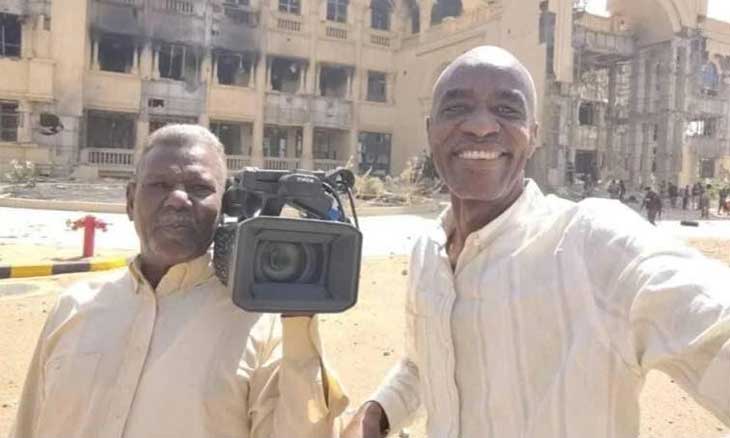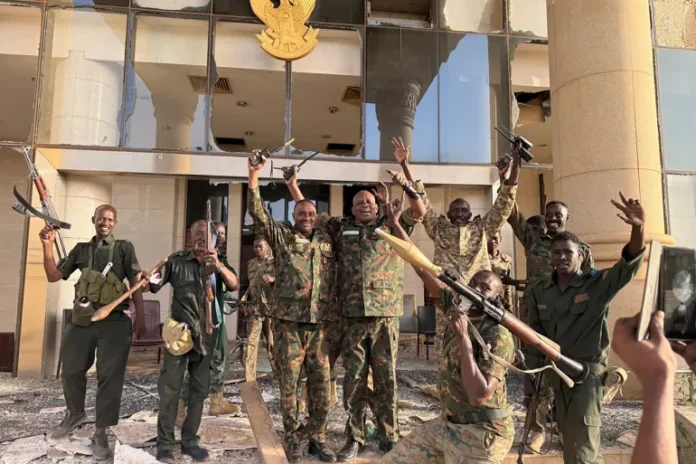Khartoum – : The Sudanese army regained control of the Presidential Palace, ministry headquarters, and government offices in central Khartoum on Friday, after violent battles around the sovereign building against the Rapid Support Forces.
Its spokesman, Nabil Abdullah, said that the army “achieved a crushing victory over the Rapid Support Forces in an epic battle in Khartoum’s axes in central Khartoum, the Arab Market, and the buildings of the Republican Palace and ministries.”
He added: “The army regained the symbol of sovereignty and dignity of the Sudanese nation and completely destroyed the personnel and equipment of the Rapid Support Forces and seized large quantities of their equipment and weapons in the mentioned areas.”
As army leaders and personnel raised the Sudanese flag atop the Republican Palace dome, the Minister of Culture and Information, the official government spokesman, Khaled Al-Ayser, said that the armed forces’ liberation of the Republican Palace at dawn on Friday is “an epic of national dignity, in which the blood of martyrs mixed with the pure soil of Sudan, and the breath of ancestors full of vigor and pride blended with the spirit of new generations continuing the same march.” He added: “Today the flag was raised, the palace returned, and the journey continues until victory is complete.”
He continued: “The Janjaweed, mercenaries, and their allies from internal agent forces and delusional external powers thought it was just a joke, but they did not realize that the battle for Sudanese dignity is not just a military confrontation like its predecessors recorded in history books, but rather an eternal message to generations that dignity is seized by the steadfastness of heroes.”
He pointed out that “every step taken by Sudanese soldiers since the morning of April 15, 2023, up to the restoration of the palace with its political and historical symbolism, has written a new glory added to the record of a nation that knows only pride and glory.”
Raising the country’s flag on its dome… after two years of battles
He explained that “the operation to restore the Sudanese Republican Palace was led by the Sudanese Armed Forces, and all supporting forces participated, including the Intelligence Service, the police, the joint forces, the Sudan Shield Forces, Browns, and Angry Without Borders.” The Joint Force of Armed Movements supporting the army said that “liberating the Republican Palace, the symbol of Sudanese state sovereignty, and the entire central Khartoum area from the grip of the Rapid Support Forces represents a pivotal step in the march to restore the Sudanese state and its prestige, and to purge the capital of elements of chaos and destruction that tampered with citizen security and the sanctity of the homeland.”
Yasser Arman, head of the Popular Movement, the Democratic Revolutionary Current, saw that the arrival of the armed forces and their allies to the Republican Palace after two years of battles is “a military achievement that should not be underestimated, and an opening for political questions before military ones.”
He pointed to the need to answer the question: “Did they enter the palace through the gate of June 30, 1989?” referring to the beginning of the previous regime’s rule, stressing that if they entered through that gate, it would deepen the political crisis and set a broad headline for the continuation of wars. He said that “entering the palace to solve the entrenched political and historical crisis should not be through its eastern, western, or southern gate, despite their military importance, but rather the important thing is that the entry to the Republican Palace should be politically through the gate of a new renaissance program that provides a historical compromise that solves national building issues, foremost of which are freedom, peace, justice, and citizenship without discrimination.”
He continued: “The real gate to enter the Republican Palace is the gate of the Sudanese revolution, which was led by great leaders in unity of civilians and military, to draw from that a light that puts our country on the path of development, progress, democracy, and solving its historical dilemmas. Those who entered the palace today from the marginalized should keep that in mind.”
The Rapid Support Forces (RSF) affirm that the fall of the palace “does not mean losing the war
The RSF spokesman, Al-Fateh Qureshi, said that the battle for the Republican Palace is not over yet, and that their forces are still present in the vicinity of the area, fighting to recapture the palace. He pointed to the execution of a swift military operation targeting a gathering of forces inside the Republican Palace and destroying various military vehicles.
However, the advisor to the RSF commander, Al-Basha Tabiq, said on the “X” platform that “the fall of the Republican Palace does not mean losing the war.”
He indicated that the battle around the palace witnessed what he described as “heroism and sacrifices.”
He affirmed that the RSF forces showed “valor, courage, and steadfastness” according to his expression.
The dissident leader from the “Justice and Equality Movement” Suleiman Sandal – who leads a group loyal to the RSF – said: “War is give and take, and a new era has indeed begun.” He added: “Anyone who thinks otherwise should review the history of wars in Sudan.”
He called for the re-establishment of a new army, indicating that the Sudan Founding Alliance – the alliance of the RSF and its loyalists – is moving forward strongly, confirming that they are proceeding to form a parallel government which he said is “to impose peace and the will of the people.”
A large number of Sudanese welcomed the news about the army’s control of the presidential palace.
Mohamed Ibrahim (55 years old), a resident of Khartoum, said, “The liberation of the palace is the best news for us since the beginning of the war because it is the beginning of the army’s control over all of Khartoum.”
He added, “We want security to return and to live without fear or hunger.
A team from Sudanese television was killed

A drone bombing operation carried out by the Rapid Support Forces on Friday claimed the lives of a media delegation from the national television team, who were covering the events of the Sudanese army’s recapture of the Presidential Palace buildings and ministries in central Khartoum.
The victims of the operation were director and program manager Farouk Al-Zaher, television cameraman Majdi Abdel Rahman, coverage vehicle driver Wajh Jaafar, and Ibrahim Madawi, who works as an editor and director within the television team, who succumbed to his injuries. The Sudanese Journalists Syndicate mourned the deceased media professionals, pointing to their dedication, devotion to work, and commitment to the most dangerous type of work, which is field coverage in wars.
Military analyst to “Al-Quds Al-Arabi”: Recapturing the palace announces the end of “Hemedti’s” coup
The successive military victories of the Sudanese army, culminating in the announcement of the liberation of the Republican Palace, is a message with great political and moral dimensions internally and externally, according to military analyst Hussam Dhul-Nun to “Al-Quds Al-Arabi,” indicating that it is tantamount to announcing “the end of the coup” carried out by the Rapid Support Forces.
He said that “the restoration of the Republican Palace and its liberation from the grip of the ‘Support’ is a great political and moral victory and represents a crushing blow to the Emirati-Israeli project that covets the seizure of Sudan’s economic capabilities on the skulls of the Sudanese people, their displacement from their land, and their elimination.”
He viewed that “from the strategic side, the restoration of the palace with its sovereign and political symbolism is a major turning point that pushes many allies of the ‘Rapid Support’ and its supporters from countries, organizations, and political entities to recalculate and evaluate their previous alliances and look at their interests according to a new vision.”
He pointed out that “the military strategy and tactical plans developed by the Sudanese Armed Forces, which were implemented accurately, started from absorbing the shock and defense, to the stage of targeting the military capabilities of the Rapid Support Forces and breaking its solid core, and moving to the stage of attack, reclaiming land, and eliminating its forces, which is a full application of what is known in military science as the four aspects of war: withdrawal, defense, advance, and attack.”
According to him, “since late September of last year when the army began crossing the White Nile and Halfaya bridges, it was clear that the armed forces had completed their preparations and arrangements in all aspects, and began the stage of advancing to attack and sweep the strongholds of the ‘Rapid Support’ and its areas of deployment.”
He explained that these operations “were carried out according to a hierarchy, starting with neutralizing the solid forces and the military machine of the Rapid Support Forces” and dispersing its forces in vast areas difficult to defend, then isolating those forces from each other, cutting off military and food supplies from them, and then targeting the field leaders of the Rapid Support Forces, which made them lose unity of command and control.”
He saw that this made them “work as units isolated from their high command, and carry out improvised operations that are not of strategic military feasibility serving the overall objectives of the war.” This was followed by multiple attacks in different areas, indicating that it was a main factor that made the “Rapid Support” lose its basic tactical advantages, which are flexibility of movement, speed of deployment, and the ability to change targets, and that it was led towards a path that was accurately drawn and professionally executed.
He pointed out that “the military strategy of the army had the intelligence factor as an important player to achieve its objectives.”
He said: In the battle of the Presidential Palace, the advance of forces coming from Karari and the Engineers Corps, west of the capital Khartoum, and their positioning in the Muqrin area west of central Khartoum, was a complete military attrition and deception operation that made the “Rapid Support” focus all its attention and concentrate its forces assuming that the liberation of central Khartoum would be from that area, which allowed the armed forces to move through other axes to supply its units with weapons, equipment, and soldiers comfortably, and complete its arrangements to invade central Khartoum from the southern and eastern sides, which is represented by the armored forces and the general command.
He added: The operations of luring and allowing elements of the “Rapid Support” to penetrate and enter central Khartoum were a security operation serving the strategic plan of the armed forces.
He viewed that the military operation that took place on Thursday in the Malha area in western Sudan complements what is happening in the capital Khartoum, and that the victory of the joint forces over the “Rapid Support” is an operation whose main objective is to allow the opportunity for the movements of the armed forces, joint forces, and resisters to reach the city of El Fasher, the capital of North Darfur state, which they entered as planned, to begin the process of reclaiming the Darfur states.
He considered the liberation of the Republican Palace as the final stage to end the war in central Sudan, and that simultaneously with this step, the last phase of the operation to restore the Darfur and Kordofan region will begin. Meanwhile, Ahmed Suleiman, a researcher at Chatham House, told Reuters that although the Rapid Support Forces still control sites in Khartoum, their presence there has become weaker than at any time since the conflict began, as the course of events indicates that these forces will be completely expelled.
He suggested that the army will continue the war in the west, which makes Sudan face “a reality characterized by conflict and division.”


